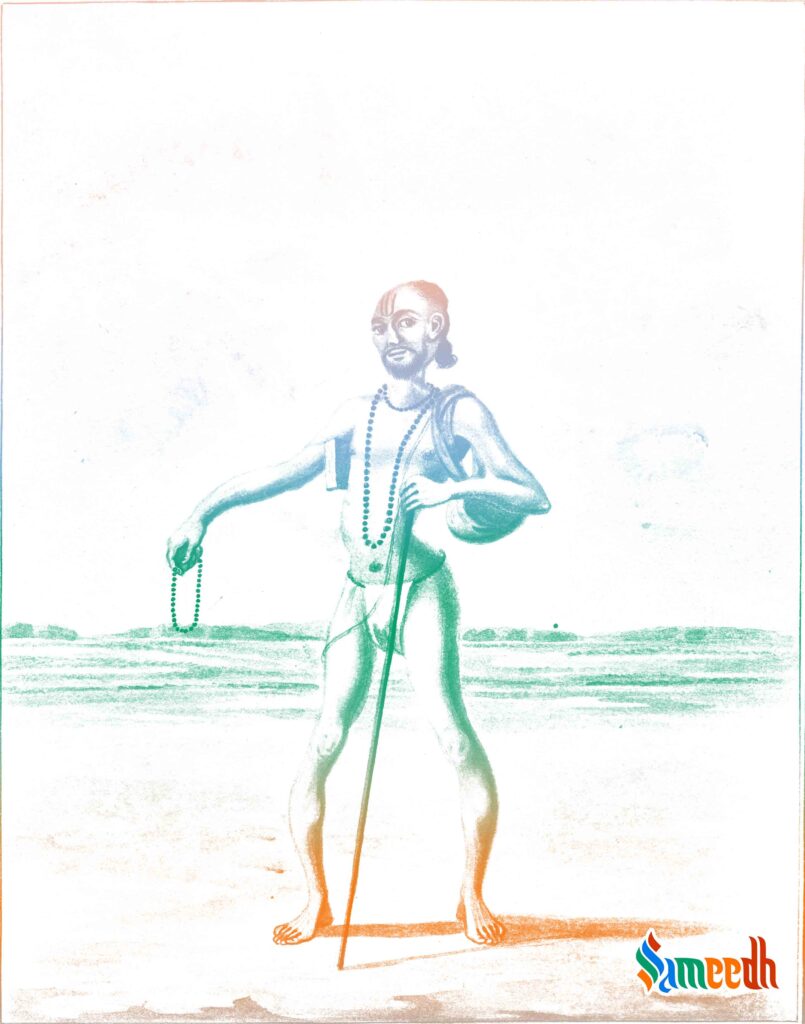This blog post talks about the sage Ashtavakra who was born with eight deformities. It details his philosophy, wisdom, and works in the field of Vedantic literature.

BACKGROUND
Rishi Ashtavakra: Born with Wisdom
The renowned sage Aruni had a daughter named Sujata who got married to a student named Kahoda who was a student at Aruni’s ashrama. Kahoda and Sujata had a baby who was born with the wisdom he heard when his father Kahoda used to recite Vedas while he was in his mother’s womb. At one such instance, Kahoda chanted the Veda incorrectly and as a fetus in the womb, he corrected his father’s incorrect recitation. This angered Kahoda immensely and he cursed him with deformities.
This is how he got the name Ashtavakra, which means eight deformities.
LIFE
Rishi Ashtavakra: The Guru of King Janaka
Since his childhood, Ashtavakra witnessed his father Kahoda participate in many debates at the court of King Janaka. When he grew up, he also participated in those debates and won the debate as well as the appreciation of King Janaka. He undertook King Janaka as his disciple and after meeting him, the king reached closer to self-awareness and enlightenment. It is said that Ashtavakra taught the king the meaning of Life, Enlightenment and made him an even better king to his kingdom.
WORKS
The Author of Ashtavakra Gita
Ashtavakra is widely known as the author of Ashtavakra Samhita or Ashtavakra Gita or the Song of Ashtavakra. This text is basically a conversation between King Janaka and Rishi Ashtavakra. It is based on the philosophy of Advaita Vedanta. This text contains twenty chapters examining the questions about the existence of life and universe. It also discusses Moksha, Tattvam, Jivanmukti and many more topics about the Self and the Universe. In the end of the text which was in the form of a song, Rishi Ashtavakra smiles because no more knowledge was left.
CONTRIBUTION IN SOCIETY
On Non-Dualism of Vedanta Philosophy
Rishi Ashtavakra emphasizes on the non-dualistic nature of existence of the Atman or the Self and the Brahman or the Universe. According to his philosophy our material existence and ego is the main hindrance to our journey towards spirituality. As per the philosophy of Rishi Ashtavakra, if one wishes to free themselves of the bondage of the material world, they need to become self-aware.
LESSON LEARNT
On Self Awareness and Meditation
To attain complete enlightenment and self-awareness, one needs to meditate properly, according to Rishi Ashtavakra. We need to work on our attachment to the material self to becoming completely aware. Our self-awareness will reflect in how we see the universe around us. Only by consistent practice of meditation, can we reach the pure self-awareness of our atman and the fact that it is all one with the Brahman.
AREA OF INFLUENCE
Rishi Ashtavakra and Liberation
According to Ashtavakra, one only sees the world and not the Universe or the Brahman when they are ignorant or full of ego. To attain liberation when living, one needs to leave the path of self-absorption and ignorance. To achieve Moksha and Liberation from the bondage of the world, one needs to let go of all the materialistic attachments and seek the truth.
Rishi Ashtavakra, Spirituality and Beyond
As a teacher of Advaita Vedanta, Rishi Ashtavakra understood the difference between the Illusion or Maya and the Truth and Brahman. According to him, to practice detachment one needs to understand the fact that our mind and body are one with the Brahman and the World. To achieve moksha or liberation, one needs to truthfully practice detachment and meditation. To understand the philosophy of Vedas and the wisdom of the Hindu culture, read every post on our blog post on Sameedh and feel enlightened.